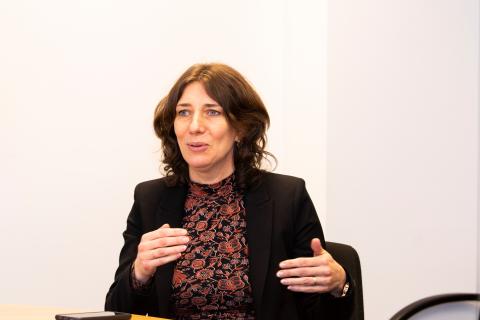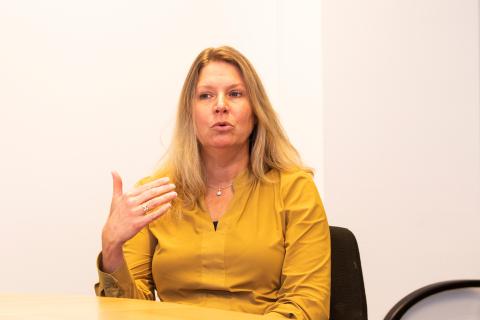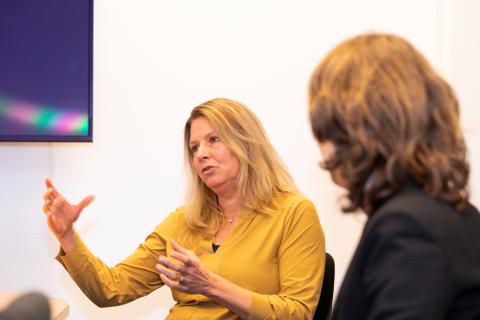“Recognition & Rewards requires a shift in thinking from administrators, those in leadership positions, and staff alike”
At the Department of Human Resources Studies (HRS) a great deal of research is being done on the design and the impact of HR policy. Dorien Kooij is its Head of Department, and in that capacity she has been experimenting with the strengths approach, diversification of career paths, and focusing on one or two domains. Charissa Freese is Endowed Professor of HRM and Social Security in Dorien’s team. They talk about their experiences.

Dorien: “The School works with a performance assessment system called MERIT (Management, Education, Research, Impact, and Team), a system in which you need to excel in all five domains to qualify for promotion. That system is impracticable for us. When you perform valuable work, you shouldn’t be required to excel in every single field. Therefore, ever since I was appointed as Head of Department in 2018, we have been busy identifying individual and team strengths
If everyone does what they are good at and enjoy doing, this will benefit more than just individual development. It will also lead to more job satisfaction and better team results
For instance, we work in research labs in which researchers from different backgrounds and with different strengths work together. This stimulates team science: collaboration on research from various perspectives and disciplines. This allows us to examine complex social issues in a more holistic way. In addition, team members have already been formulating their own strengths for some time in what is now referred to as the P&TD interviews (Performance & Talent Development interviews). If everyone does what they are good at and enjoy doing, this will benefit more than just individual development. It will also lead to more job satisfaction and better team results. As a Department, we also look at objectives and strengths within a team. An optimal task division will add value to the whole, a development that you increasingly see in the world outside the university as well.”
Fine-tuning
Charissa: “Recognition & Rewards covers the same domains as the current MERIT system, but the old system left no room for fine-tuning. Dorien instigated that change, and it’s a good one; the potential for differentiation makes staff feel appreciated for their specific contribution, their strength. And it gives them more freedom to shape their careers using their own ambitions and talents.”
Work pressure
Another plus of Recognition & Rewards is its beneficial effect on work pressure, according to Charissa. “It is no longer required to do everything at once. For example, there is the opportunity to focus on education for a while after completing a period of research. Not having to do everything at once reduces work pressure. It also gives staff the opportunity to more fully develop their subject expertise.”
Not having to do everything at once reduces work pressure. It also gives staff the opportunity to more fully develop their subject expertise

Focus on strengths
The Department is currently engaged in integrating the strengths approach with the new set-up of the P&TD interviews. Dorien: “At our Department, the dialogs about the strengths of staff members evolved gradually. We notice that we now speak a common language and, therefore, communicate better and have a clearer understanding of what we can expect from each other, for example in the research labs. In the new P&TD system, individual goals can be shared in the team, enabling staff to understand each other’s talents and choices. It also makes it easier to give peer feedback, it increases self-reflection, and it enhances dialog. By now all staff have identified their strengths. The team training is scheduled for January.”
We have made an overview of Frequently Asked Questions.
- Read more about the concerns that exist.
- And how we are dealing with them here at Tilburg University.
- The information is regularly updated and updated.
High expectations
Within the Department, the response to the changes set in motion by Recognition & Rewards is positive. Dorien: “At the same time, expectations are high. Colleagues are keen to find out whether Recognition & Rewards will really deliver the change everyone is hoping for. Our Department has been using the new system for quite some time now. But actually promoting staff in accordance with it proved to be exceptionally difficult, because promotion policy and criteria used university-wide and at the Schools have yet to be adjusted.”
In the new P&TD system, individual goals can be shared in the team, enabling staff to understand each other’s talents and choices.
The benefits
The benefits of diversification of career tracks for the university? Dorien: “Increased and improved use of each other’s talents. Implementing Recognition & Rewards gives all staff – not just research staff – the space and the calm to shape their own career mobility, both upwardly and laterally. A more diverse way of working together leads to better team results, because everyone has their own focus area.”
Non-standard career track

Charissa’s career track was an unusual one and she ran into a number of stumbling blocks along the way. “Following my graduation in Organizational Psychology in Tilburg, I did PhD research, but I found it too monotonous. I wanted to teach and for ten years I did, at Human Resources and Labour of Avans University of Applied Sciences in Den Bosch. It was there that I finished my PhD thesis. By that time, I had begun to miss proper scientific research.
I first joined Tilburg University part-time, as a thesis supervisor for graduating students, and later went back to working at the university full-time. Over the years, I built up a range of duties that matched my strengths as well as the university’s strategy but not any official job profile. I engaged with impact at the People Management Center, the Human Resource Studies platform where external organizations and our staff collaborate on HRM issues.
I hope it will create a greater diversity of career paths, and that good, talented, and motivated colleagues who contribute to the key objectives of both the department and the university are eligible for tenure, better opportunities for advancement and appointments, and in this way receive the recognition they deserve
I also did contract research and was involved in education through thesis supervision and executive education at TIAS. After a number of temporary contracts, I was offered a permanent position as a valorization officer. That is not a research position, which is why a different appraisal system applied, one that could not take into account all the work I did. That made it really difficult to evolve as a scientific academics, but that was what I wanted. One effect of my combined work portfolio was that I had fewer publications to my name than regular researchers, which is why I did not have an excellent performance in all five domains. As a result, making ‘Researcher 1’ and being appointed professor in early 2021 was anything but easy. With Dorien’s help and that of my previous managers Jaap Paauwe and Marc van Veldhoven I managed to do it. I was given time to work on my publications, which resulted in the fifth domain eventually being appraised as excellent, too.”
Implementing Recognition & Rewards gives all staff – not just academics – the space and the calm to shape their own career mobility, both upwardly and laterally
Eagerly awaiting
Charissa has this to say about Recognition & Rewards: “I hope it will create a greater diversity of career paths, and that good, talented, and motivated colleagues who contribute to the key objectives of both the department and the university are eligible for tenure and better opportunities for advancement and appointments, and in this way receive the recognition they deserve. Many colleagues eagerly await the moment this becomes a reality.”
Key role for those in leadership positions
The system is primarily a useful tool, Dorien concludes. “What matters most is the shift in thinking that will need to take place within Schools and across the university. Recognition & Rewards impacts on how departments are managed, and that is why those in leadership positions are a critical success factor in making this shift happen. We know that staff endorse it; our own experience at the Department is a case in point. What matters is that higher echelons share the sense of urgency.”
Read more about Recognition and Rewards
Want to read more about Recognition and Rewards? on our website you will find the background and we will answer the frequently asked questions.

